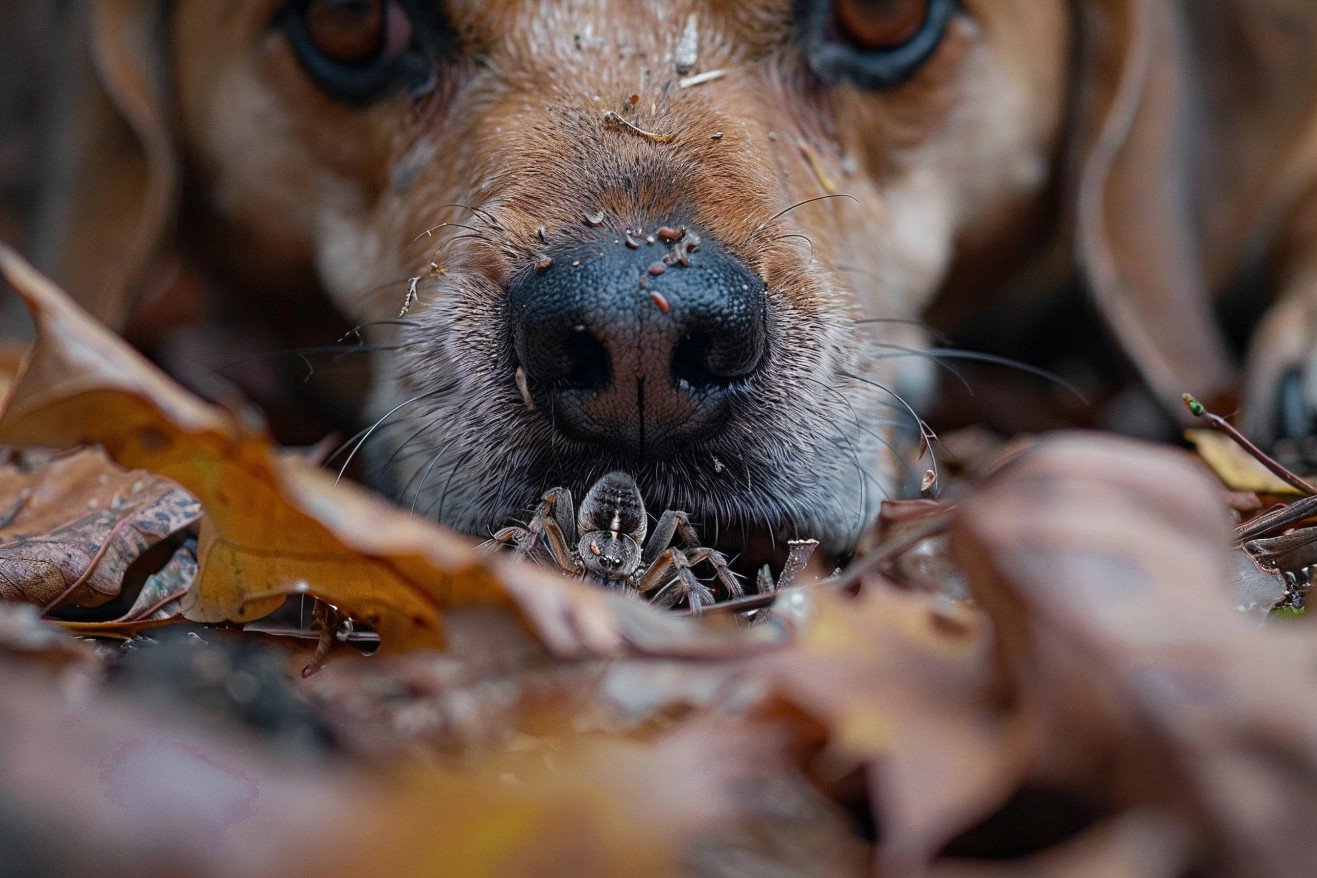Can a Wolf Spider Bite a Dog? What You Need to Know
26 May 2024 • Updated 25 May 2024

Are you concerned about your dog running into wolf spiders while out on a walk or in your yard? There's no reason to worry, as wolf spiders are not poisonous or harmful to dogs, although their bites can lead to some irritation and swelling. Their venom is meant to help them catch their insect prey and is not potent enough to cause harm to dogs.
In this article, we'll take a closer look at the science behind wolf spiders and their interactions with pet dogs. Drawing on the expertise of arachnologists, veterinarians, and animal behaviorists, we'll separate fact from fiction when it comes to these interesting yet often maligned arachnids. By the time we're done, you'll know how to recognize wolf spiders, what to do if your dog is bitten, and why you don't need to worry if you come across these mostly harmless eight-legged creatures.
Are wolf spiders poisonous to dogs?
What We Know About Wolf Spider Venom and How It Affects Dogs
Wolf spider venom is not considered medically significant or life-threatening to dogs. This is because wolf spiders are not venomous to humans or dogs. Their venom is meant to paralyze and break down the bodies of their insect prey, not to cause systemic harm to larger animals like dogs. That said, while the venom is not poisonous, it can cause mild symptoms at the site of the bite, including pain, swelling, redness, and itching in dogs according to Banner Pest Services.
These symptoms are generally mild and go away on their own within 5-20 minutes without any treatment according to Dogster. That said, in some cases, dogs with compromised immune systems or allergies may be more sensitive to the venom and experience more severe symptoms after a wolf spider bite according to Hepper. It's also important to note that the symptoms of a wolf spider bite are much less severe than those of a bite from a black widow or brown recluse.
How to Tell If Your Dog Has Been Bitten by a Wolf Spider
Wolf spiders are non-aggressive, so their bites are often painless and may even go unnoticed. Dogster explains that some of the most common signs of a wolf spider bite in dogs include sudden crying or yelping, limping, and chewing or scratching at the bite site. Swelling, redness, and mild itching or discomfort may occur at the site of the bite within minutes.
If your dog experiences more severe symptoms, such as blistering, fever, or excessive swelling, they may be having an allergic reaction or an infection, and you should take them to the vet, according to Hepper. It can be helpful to capture or take a picture of the spider that bit your dog to confirm that it was a wolf spider and not a more dangerous species, says Modesto Vet. This is especially important because the symptoms of a wolf spider bite can be similar to those of other venomous spiders.
First Aid and Home Treatment for Wolf Spider Bites on Dogs
If the bite is mild, basic first aid and home treatment may be all that's needed. Ferguson Animal Hospital says to make sure to clean the bite area with soap and water to prevent infection. You can also use a cold compress or ice pack (make sure to wrap it in a towel) to help with swelling and pain. BetterPet also suggests using over-the-counter antihistamines or anti-inflammatory medication to help with itching and swelling.
Keep a close eye on the bite for any signs of infection or symptoms that are getting worse, which HolistaPet says will need to be treated by a vet. While these at-home treatments can help with non-venomous wolf spider bites, make sure to get medical help if your dog has a more severe reaction or if the bite isn't getting better.
When to Get Veterinary Help for Spider Bites on Dogs
Get your dog to a vet immediately if you suspect a black widow or brown recluse spider bite, as their venom can be deadly according to Hill's Pet. If a wolf spider bite results in severe swelling, extreme pain, blistering, or any other worrisome symptoms, contact your vet. In addition, if your dog has an allergic reaction to a spider bite, such as difficulty breathing or severe vomiting, the AKC recommends seeking veterinary care.
If your dog licks or chews the bite excessively, you may need to get treatment for the wound to prevent infection or tissue damage. According to the Kleinpeter Veterinary Hospital, if you're unsure, it's always best to be safe and have a vet look at the bite. This will help make sure that any serious spider bites are caught and treated before they become more serious.
How to Avoid Wolf Spiders and Wolf Spider Bites in Dogs
Wolf spiders are often found in gardens, yards, and wooded areas, so it is likely that dogs will come into contact with them. Banner Pest Services suggests that people can reduce the risk of wolf spider bites in dogs by keeping yards and other outdoor spaces free of debris, woodpiles, and dense vegetation, all of which can provide hiding places for spiders. In addition, using insect repellents and sprays that are safe for dogs can help keep spiders away, according to BetterPet.
Training dogs to obey the 'leave it' command can help prevent them from disturbing or trying to eat spiders, says the Merck Veterinary Manual. In addition, people can help prevent spider infestations by regularly checking outdoor areas for spider webs and egg sacs and removing them, according to Ferguson Animal Hospital. By taking these steps, dog owners can ensure that they and their pets can live in harmony with these interesting arachnids.
Conclusion: Putting Wolf Spider Bites Into Perspective
While wolf spider bites can be scary, they are not typically a big deal for dogs. Their venom is not considered medically significant or life-threatening to canine companions.
If you know the signs of a wolf spider bite and can administer the right first aid, most bites can be treated at home and won’t lead to any issues. That said, it's important to get your dog to the vet if they experience a severe reaction, show signs of infection, or if you suspect they’ve been bitten by a more venomous spider.
By taking the right precautions and staying alert, dog owners can live in harmony with these interesting arachnid neighbors. Banner Pest Services recommends keeping outdoor areas free of clutter and using repellents to help keep wolf spiders away.


